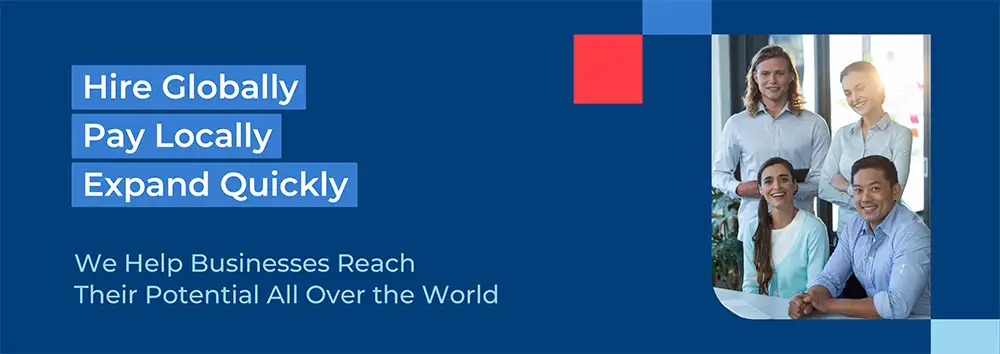San Francisco, the heart of the Bay Area in California, is globally recognized as one of the most innovative and influential business hubs in the world. Known as the epicenter of Silicon Valley, San Francisco is home to thousands of startups, tech giants, and venture capital firms.
Companies that hire in San Francisco gain access to one of the most skilled, innovative, and diverse workforces in the United States.
However, with high demand for top talent, complex employment regulations, and one of the highest costs of living in the U.S., hiring in San Francisco requires careful planning and compliance.
This guide provides everything you need to know about recruiting in San Francisco in 2025, including legal requirements, taxation, salaries, and recruitment strategies.
How to Hire in San Francisco Easily in 2025
Hiring in San Francisco can be done through two main approaches:
- Setting up a U.S. entity in California — Companies establish a local subsidiary and take full responsibility for compliance, payroll, and HR management. This offers control but requires time, resources, and legal expertise.
- Using an Employer of Record (EOR) — A faster and more efficient option that allows businesses to hire employees in San Francisco without opening a local entity. The EOR manages payroll, benefits, contracts, and legal compliance, while the company directs the employee’s daily work.
To hire successfully in San Francisco, employers must:
- Comply with U.S. federal labor laws and California state-specific regulations.
- Provide competitive salaries and benefits to attract top-tier talent in a highly competitive market.
- Register for federal and state taxes, including California’s payroll tax requirements.
- Build recruitment pipelines through universities, professional associations, and industry events.
Why Hire in San Francisco? The Benefits of Hiring in San Francisco
Strategic Location
San Francisco is at the center of global technology, finance, and innovation. Its location provides direct access to venture capital, startups, and global talent. The city’s international airport connects to major markets across Asia, Europe, and Latin America, making it ideal for companies seeking international expansion.
Strong Talent Pool
San Francisco has one of the most highly educated workforces in the U.S. The city is surrounded by world-class universities such as Stanford University and the University of California, Berkeley (UC Berkeley), producing graduates in engineering, business, and computer science. The Bay Area also attracts global talent across industries, particularly in technology, biotech, and finance.
Diverse Economy
While technology dominates, San Francisco’s economy is diverse, with major industries including biotechnology, healthcare, financial services, tourism, renewable energy, and creative industries. This diversity allows employers to tap into multiple sectors and reduces reliance on any single industry.
Innovation Ecosystem
San Francisco is at the center of the startup and venture capital ecosystem, making it the best city in the U.S. for innovation. Companies that hire here benefit from being part of an environment that fosters creativity, growth, and access to investment.
Legal Requirements for Hiring Employees in San Francisco
Hiring in San Francisco requires strict compliance with both federal labor laws and California’s highly employee-protective regulations.
Employment Contracts
California is an “at-will” employment state, meaning either the employer or employee can end the relationship at any time, provided the termination does not violate labor or anti-discrimination laws. While written contracts are not required, they are strongly recommended to define compensation, responsibilities, and benefits.
Working Hours and Overtime
The standard workweek in California is 40 hours. Employees classified as “non-exempt” must receive overtime pay of 1.5 times their hourly rate for hours worked beyond 40 in a week or 8 in a day, and double time for work exceeding 12 hours in a day.
Probation Periods
California law does not mandate probation periods, but employers commonly use 90-day trial periods.
Termination of Employment
While employment is at-will, California imposes strict anti-discrimination, anti-retaliation, and employee rights protections. Employers must carefully document reasons for termination to avoid wrongful dismissal claims. Severance pay is not legally required but is often provided in competitive industries to maintain reputation and goodwill.
Taxation and Social Security Contributions in San Francisco
Employers hiring in San Francisco must comply with both federal tax laws and California-specific requirements.
1. Individual Income Tax (IIT)
California has one of the highest state income tax rates in the U.S., ranging from 1% to 13.3% depending on income. Employees in San Francisco must also pay federal income tax (10% to 37%). Employers are responsible for withholding both.
2. Employer Contributions to Social Insurance
Employers must contribute to several programs:
- Social Security: 6.2% of wages (matched by employees).
- Medicare: 1.45% of wages (also matched by employees).
- Federal Unemployment Tax (FUTA): 0.6% on the first $7,000 of wages after credits.
- California State Unemployment Insurance (SUI): Varies by employer experience.
- Employment Training Tax (ETT): 0.1% of the first $7,000 in wages.
- State Disability Insurance (SDI): Employees contribute 0.9% of wages (employer withholds).
3. Contribution Bases
Social Security is capped at a federal wage base (around $168,600 in 2025). Medicare has no cap, but employees earning above $200,000 annually must pay an additional 0.9% surtax.
Work Permits and Other Requirements for Hiring Foreign Workers in San Francisco
As one of the most international cities in the U.S., San Francisco attracts large numbers of foreign professionals. Employers hiring foreign workers must comply with immigration laws.
- Visa Sponsorship: Common visas include H-1B (specialty occupations), L-1 (intra-company transfers), and O-1 (extraordinary ability). Sponsorship requires demonstrating the role cannot be filled by a local candidate.
- Labor Condition Application (LCA): Required for certain visas, ensuring compliance with wage levels and labor protections.
- E-Verify: Many San Francisco employers use this system to verify employee eligibility.
- Background and Health Checks: Certain visas require criminal background checks and medical clearance.
Current Trends and Top Recruitment Strategies in San Francisco
San Francisco is one of the most competitive hiring markets in the world. Companies must be strategic to attract and retain talent.
- Tech and Biotech Talent Demand: Employers compete for professionals in software, AI, biotech, and renewable energy. Highlighting innovation, equity packages, and professional development is crucial.
- Diversity and Inclusion: San Francisco’s workforce is highly diverse, and companies are expected to demonstrate strong D&I policies.
- University Partnerships: Building ties with Stanford, UC Berkeley, and San Francisco State University provides access to top graduates.
- Flexible Work Options: Hybrid and fully remote work remain highly valued by employees in San Francisco. Offering flexibility is essential to attract talent.
Hiring Skilled Workers vs. Entry-Level Talent in San Francisco
Hiring Skilled Workers
San Francisco’s skilled professionals expect competitive compensation, equity in companies, and strong benefits packages. To attract them, employers must emphasize career growth, innovation opportunities, and workplace culture.
Hiring Entry-Level Talent
With universities in close proximity, entry-level candidates are abundant. To attract younger workers, employers should focus on mentorship programs, training opportunities, and career development pathways.
Common Benefits in San Francisco
- Comprehensive health, dental, and vision insurance
- 401(k) retirement plans with employer matching
- Equity or stock options (common in startups and tech companies)
- Unlimited or flexible paid time off (PTO) policies
- Wellness programs, gym memberships, and mental health support
- Remote or hybrid work models
Hiring Solutions for Foreign Companies in San Francisco
Foreign companies hiring in San Francisco have three main options:
Independent Contractors: Provides flexibility but requires proper classification under IRS and California laws to avoid misclassification penalties.
Establishing a U.S. Entity: Allows full control but requires incorporation, state registration, and ongoing compliance.
Employer of Record (EOR): The most efficient solution for businesses entering the San Francisco market. An EOR handles payroll, HR compliance, and benefits, while the company focuses on managing employee responsibilities.
Trust INS Global to Hire in San Francisco Today
San Francisco remains one of the most important global hiring hubs in 2025. With its unparalleled access to top talent, innovative ecosystem, and strategic global connections, the city offers unmatched opportunities for companies across industries.
Yet, the complexity of U.S. and California labor laws, combined with the competitive hiring market, makes compliance challenging. This is where INS Global can help.
Our Employer of Record (EOR) services simplify the hiring process in San Francisco, allowing your business to recruit top professionals while ensuring compliance with all regulations.



SHARE